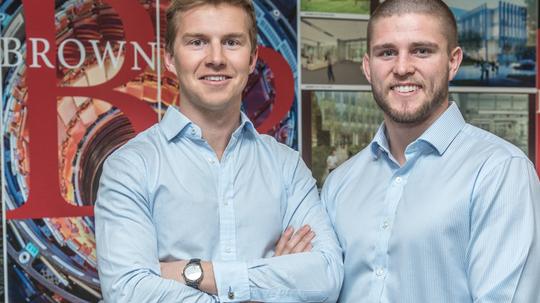
While Clemens Grave and Richard McDonald grew up on different continents, they were united by a common problem: cultures were childhood financial education was … lacking.
Cut to 2015, when the pair met at Brown University’s PRIME — Program in Innovation Management and Entrepreneurship — a Master’s track. It was there that they hatched Finnest, pronounced Fin-nest, an app-connected, prepaid debit card. It’s designed to both empower and educate children with and about money at a formative age, or, to encourage them to financially leave the nest and build their own nest egg, as it were. (It should come to no surprise that company’s logo and terminology is decidedly avian.)
Among the tool’s features include a savings functionality, parent-monitored money transferring abilities — making payday for allowances a snap! — and incentivized educational activities. It boasts full FDIC insurance and compliance. And while the prepaid debit card belongs to the users, parents can ultimately block and unblock the card and approve usage. “The web interfaces are basic, and it’s not a full blown mobile app,” Grave said. “Our intended goal was to give kids early experience … [to] make mistakes before they count.”
Yet Finnest did not spring from its creators’ minds fully formed.
While at first blush, their undergrad degrees in various engineering specialties may not have immediately appeared to lend themselves to business work, the duo said it provided them a unique, 30,000-foot perspective, giving them insight into areas their more traditionally trained peers were lacking. “Dissecting a problem is really what mechanical engineering is about,” Grave said.
That attitude eventually led them to develop Finnest.
“We had many, many conversations,” Grave said, during which they compared notes on their levels of financial literacy growing up, on what kind of tool they thought would benefit both children and their parents, and what products were already out there. After looking at the market, they found that there weren’t many financial programs doing what they wanted to do. Coupled with the feedback they were getting from parents, “who were really worried their kids were not understanding money management,” Grave said, they knew they were on to something.
"It’s about long-term thinking earlier. Everything is instant today.”
From there, Grave and McDonald spent time immersing themselves in the industry, getting to know how pre-paid cards worked while “interviewing hundreds of parents and trying to understand what they really care about,” Grave said.
Then, it was about taking their knowledge and making something out of it.
Finnest was a finalist at the MIT FinTech Hackathon, which Grave called "an event of validation" for the team. "It helped us further define the Finnest app and continue the development," he continued. "As a result of it we launched our first Minimum Viable Product shortly after and since then have a growing number of users."
The Finnest team also took part in the Social Enterprise Greenhouse's accelerator program in Providence.
During that time, they also brought on an integral computer programmer, an uncommon move for services like theirs, Grave said. “We really needed that technical person on board.”
After getting chosen to participate in MassChallenge, Finnest became a star on the rise. The June 2017 move got the duo “quite a bit of attention,” Grave said.
“We’ve had conversations with investors, some of whom some approached us after graduating from our first accelerator,” he added.
Grave broke that down for me. "Until now we supported Finnest solely with personal funds and have no outside investors," he said. "However, we just started raising our first round of capital through angel investors and are launching an equity crowd founding campaign soon to give our early users and fans a chance to become part of our journey as well."
Where does that leave the team? A few months out from official launch, testing subscription model fees and considering functionalities to potentially make Finnest a free tool.
Immediate roll-out concerns aside, Grave and McDonald are dreaming big — rightfully so, as the app already has a waitlist that is still successfully courting participants.
Yet it's not only about the number of users, but also the impact the app has on those who engage. With Finnest, “the key value is future orientating,” McDonald said. “We don’t want to change the world, but instead make financial literacy in the U.S. increase, and help kids grow up a little further from this consumer driver approach [where everyone] finances everything on loans. It’s about long term thinking earlier. Everything is instant today.”
Considering the reception Finnest received, their goals may not be far off. “We learned that parents really value how it makes finances a piece of their household now: dinner conversation, car talks — [it’s become] more tangible,” McDonald said.








